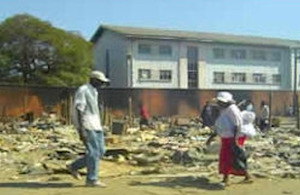DFID Research: what can be done to beat urban poverty?
DFID-funded research investigates the impact of different approaches to urban poverty reduction.

Scenes after forced urban slum clearance in Zimbabwe. Picture: Wikimedia Commons
The challenge of urban poverty is growing every year. It is predicted that over 95% of global population growth between 2000 and 2030 will take place in the cities of the developing world. If current trends continue the majority of those will end up in slums.
Three-quarters of global population increase is currently occurring in the urban South, causing rapid growth in cities that struggle to accommodate this unprecedented upsurge. Urban population growth is particularly pronounced in Asia - by 2010 over half of urban citizens will be living in Asia - a considerable difference from 1950 when over 50% of the global urban population was in Europe and North America.
Urban poverty is linked to a number of global issues that are of significant concern to governments and development agencies. The Millennium Development Goals specifically target urban poverty, seeking to ‘improve the lives of 100 million slum dwellers by 2010’, and to do this it is recognised that agencies increasingly have to work at a local level, finding new ways to work with poor urban communities, decentralised local government and non-government organisations (NGOs).
A DFID-funded research project by Practical Action has improved understanding of the impact of different approaches to urban poverty reduction through research and sharing the experiences of Southern-based NGOs. Research carried out in 8 countries (Angola, Bangladesh, Mozambique, Pakistan, South Africa, Sri Lanka, Sudan, and Zimbabwe) contained several key messages:
What works?
Improvements in infrastructure - water supply, sanitation, drainage, solid waste disposal, roads and footpaths and basic housing - have the greatest impacts on urban livelihoods
Income generating initiatives don’t work unless the basic infrastructure is in place, but once they are, credit and micro enterprise initiatives can be very effective
NGOs can help build up the capacity of community organisations, but it is these community organisations that need to be lead partners in urban initiatives
NGOs have a vital role in establishing basic services in settlements of internal refugees that have been born through crises
The research has already been put into practice in several countries. Practical Action Bangladesh has developed a completely new urban programme based on the research findings which works with other NGOs to press for coordinated action on improving basic infrastructure, and in Chitungwiza, Harare, Zimbabwe the research is pointing the way to find new ways of coping with the economic and political crisis, helping build partnerships to reconstruct communities after forced slum clearances.